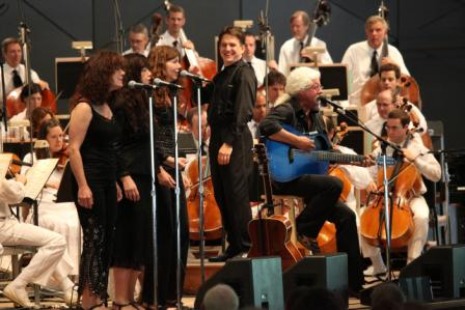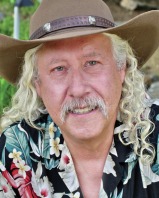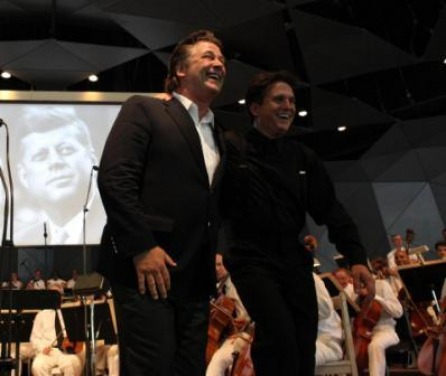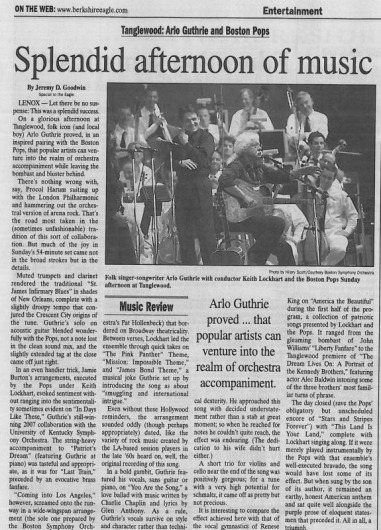
Hilary Scott photo
Splendid afternoon of music
Published in Berkshire Eagle, 7/20/10
By Jeremy D. Goodwin
LENOX—Let there be no suspense: this was a splendid success.
On a glorious afternoon at Tanglewood, folk icon (and local boy) Arlo Guthrie proved, in an inspired pairing with the Boston Pops, that popular artists can venture into the realm of orchestra accompaniment while leaving the bombast and bluster behind.
There’s nothing wrong with, say, Procol Harum suiting up with the London Philharmonic and hammering out the orchestral version of arena rock. That’s the road most taken in the (sometimes unfashionable) tradition of this sort of collaboration. But much of the joy in Sunday’s 54-minute set came not in the broad strokes but in the details.
Muted trumpets and clarinet rendered the traditional “St. James Infirmary Blues” in shades of New Orleans, complete with a slightly droopy tempo that conjured the Crescent City origins of the tune. Guthrie’s solo on acoustic guitar blended wonderfully with the Pops, not a note lost in the clean sound mix, and the slightly extended tag at the close came off just right.
In an even handier trick, Jamie Burton's arrangements, executed by the Pops under the hand of Keith Lockhart, evoked sentiment evoked sentiment without ranging into the sentimentality sometimes evident on In Times Like These, Guthrie’s still-winning 2007 collaboration with the University of Kentucky Symphony Orchestra. The string-heavy accompaniment to “Patriot’s Dream” (featuring Guthrie at piano) was tasteful and appropriate, as it was for “Last Train,” preceded by an evocative brass fanfare.
Published in Berkshire Eagle, 7/20/10
By Jeremy D. Goodwin
LENOX—Let there be no suspense: this was a splendid success.
On a glorious afternoon at Tanglewood, folk icon (and local boy) Arlo Guthrie proved, in an inspired pairing with the Boston Pops, that popular artists can venture into the realm of orchestra accompaniment while leaving the bombast and bluster behind.
There’s nothing wrong with, say, Procol Harum suiting up with the London Philharmonic and hammering out the orchestral version of arena rock. That’s the road most taken in the (sometimes unfashionable) tradition of this sort of collaboration. But much of the joy in Sunday’s 54-minute set came not in the broad strokes but in the details.
Muted trumpets and clarinet rendered the traditional “St. James Infirmary Blues” in shades of New Orleans, complete with a slightly droopy tempo that conjured the Crescent City origins of the tune. Guthrie’s solo on acoustic guitar blended wonderfully with the Pops, not a note lost in the clean sound mix, and the slightly extended tag at the close came off just right.
In an even handier trick, Jamie Burton's arrangements, executed by the Pops under the hand of Keith Lockhart, evoked sentiment evoked sentiment without ranging into the sentimentality sometimes evident on In Times Like These, Guthrie’s still-winning 2007 collaboration with the University of Kentucky Symphony Orchestra. The string-heavy accompaniment to “Patriot’s Dream” (featuring Guthrie at piano) was tasteful and appropriate, as it was for “Last Train,” preceded by an evocative brass fanfare.

More Arlo...
See my interview with Arlo, Sarah Lee Guthrie
and Johnny Irion before the fall 2009
"Guthrie Family Rides Again" Tour
and
my review of that show
See my interview with Arlo, Sarah Lee Guthrie
and Johnny Irion before the fall 2009
"Guthrie Family Rides Again" Tour
and
my review of that show

Hilary Scott photo
“Coming into Los Angeles,” however, screamed onto the runway in a wide-wingspan arrangement (the sole one prepared by the Boston Symphony Orchestra’s Pat Hollenbeck) that bordered on Broadway theatricality. Between verses, Lockhart led the ensemble through quick takes on “The Pink Panther Theme,” “Mission: Impossible Theme,” and “James Bond Theme,” a musical joke Guthrie set up by introducing the song as about “smuggling and international intrigue.” Even without these Hollywood reminders, the arrangement sounded oddly (though perhaps appropriately) dated, like the variety of rock music created by the LA-based session players in the late ‘60s heard on, well, the original recording of this song.
In a bold gambit, Guthrie featured his vocals, sans guitar or piano, on “You Are the Song,” a love ballad with music written by Charlie Chaplin and lyrics by Glen Anthony. As a rule, Guthrie’s vocals survive on style and character rather than technical dexterity. He approached this song with decided understatement rather than a stab at great moment; so when he reached for notes he couldn’t quite reach, the effect was endearing. (The dedication to his wife didn’t hurt either.) A short trio for violins and cello near the end of the song was positively gorgeous; for a tune with a very high potential for schmaltz, it came off as pretty but not precious.
It is interesting to compare the effect achieved here with that of the vocal gymnastics of Renese King on “America the Beautiful” during the first half of the program, a collection of patriotic songs presented by Lockhart and the Pops. It ranged from the gleaming bombast of John Williams’ “Liberty Fanfare” to the Tanglewood premiere of “The Dream Lives On: A Portrait of the Kennedy Brothers,” featuring actor Alec Baldwin intoning some of the three brothers’ most familiar turns of phrase. (Video below.)
The day closed (save the Pops’ obligatory but unscheduled encore of “Stars and Stripes Forever”) with “This Land Is Your Land,” complete with Lockhart singing along. If it were merely played instrumentally by the Pops with that ensemble’s well-executed bravado, the song would have lost some of its effect. But when sung by the son of its author, it remained an earthy, honest American anthem and sat quite well alongside the purple prose of eloquent statesmen that preceded it. All in all, a triumph.
In a bold gambit, Guthrie featured his vocals, sans guitar or piano, on “You Are the Song,” a love ballad with music written by Charlie Chaplin and lyrics by Glen Anthony. As a rule, Guthrie’s vocals survive on style and character rather than technical dexterity. He approached this song with decided understatement rather than a stab at great moment; so when he reached for notes he couldn’t quite reach, the effect was endearing. (The dedication to his wife didn’t hurt either.) A short trio for violins and cello near the end of the song was positively gorgeous; for a tune with a very high potential for schmaltz, it came off as pretty but not precious.
It is interesting to compare the effect achieved here with that of the vocal gymnastics of Renese King on “America the Beautiful” during the first half of the program, a collection of patriotic songs presented by Lockhart and the Pops. It ranged from the gleaming bombast of John Williams’ “Liberty Fanfare” to the Tanglewood premiere of “The Dream Lives On: A Portrait of the Kennedy Brothers,” featuring actor Alec Baldwin intoning some of the three brothers’ most familiar turns of phrase. (Video below.)
The day closed (save the Pops’ obligatory but unscheduled encore of “Stars and Stripes Forever”) with “This Land Is Your Land,” complete with Lockhart singing along. If it were merely played instrumentally by the Pops with that ensemble’s well-executed bravado, the song would have lost some of its effect. But when sung by the son of its author, it remained an earthy, honest American anthem and sat quite well alongside the purple prose of eloquent statesmen that preceded it. All in all, a triumph.

